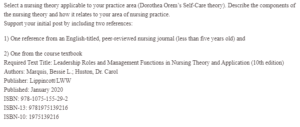Dorothea Orem’s Self-Care theory
Every individual can care for themselves and their dependents. Dorothea Orem believed that when a person can take care of themselves, they should, and a nurse should aid them if they can’t take care of themselves. Nursing promotes self-care. Dorothea Orem’s theory is based on three concepts to help nurses make decisions when implementing patient care. These concepts are the theory of self-care, the theory of self-care deficit, and the nursing system (McEwen & Willis, 2018).
Dorothea’s self-care theory is based on a person’s ability to take care of themselves, including performing activities of daily living. It promotes an individual’s independence. Self-care is the ability of individuals to initiate and perform activities that promote health and well-being. An individual’s ability to perform self-care can depend on age, gender, presence of a support system, and health state. Patients with schizophrenia are more likely to take better care of themselves if they have a support system. Patients with suicidal ideations should be treated inpatient for better outcomes.
Orem’s self-care deficit theory focuses on an individual’s ability to provide care (Marquis & Huston, 2021). Individuals should receive assistance if they don’t meet personal needs independently. Nurses should care for such patients by providing physical and emotional support, education, and environmental safety. For example, this theory can be used in schizophrenia patients who are not compliant with the medications provided. Such a patient can be educated on the benefits of taking medication. A safe environment can be provided to ensure such patients don’t harm themselves in any way, such as by suicide.
The last theory is the theory of nursing systems. This theory uses three systems to provide nursing interventions that help individuals to achieve self-care needs. These are the educative, partial, and wholly compensatory systems. An educative system educates patients who can perform self-care (Marquis & Huston, 2021). A partial compensatory system is used for a patient who needs urgent care, such as a patient who has an acute episode of schizophrenia. Care is initially provided before they recover and return to caring for themselves.
References
Marquis, B. L., & Huston, C. J. (2021). Leadership roles and management functions in nursing: Theory and application. Wolters Kluwer Health.
McEwen, M., & Wills, E. M. (2018). Theoretical basis for nursing (5th ed.). Wolters Kluwer, (5),36-145
ORDER A PLAGIARISM-FREE PAPER HERE
We’ll write everything from scratch
Question 
Select a nursing theory applicable to your practice area (Dorothea Orem’s Self-Care theory). Describe the components of the nursing theory and how it relates to your area of nursing practice.
Support your initial post by including two references:

Dorothea Orem’s Self-Care theory
1) One reference from an English-titled, peer-reviewed nursing journal (less than five years old) and
2) One from the course textbook
Required Text Title: Leadership Roles and Management Functions in Nursing Theory and Application (10th edition)
Authors: Marquis, Bessie L.; Huston, Dr. Carol
Publisher: Lippincott/LWW
Published: January 2020
ISBN: 978-1075-155-29-2
ISBN-13: 9781975139216
ISBN-10: 1975139216